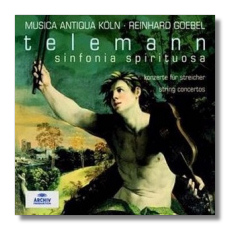
The Internet's Premier Classical Music Source
Related Links
- Telemann Reviews
- Latest Reviews
- More Reviews
-
By Composer
-
Collections
DVD & Blu-ray
Books
Concert Reviews
Articles/Interviews
Software
Audio
Search Amazon
Recommended Links
Site News
 CD Review
CD Review
Georg Philipp Telemann

String Concertos II
- Sonata for Trumpet, 2 Violins, Viola & Continuo in D Major "Sinfonia spirituosa", TWV 44:1
- Suite for Viola de Gamba & Strings in D Major, TWV 55/D 6
- Concerto for 4 Violins in C Major, TWV 40:203
- Concerto for 4 Violins, Strings & Continuo in A Major, TWV 54:A1
- Concerto for 4 Violins in G Major, TWV 40:201
- Concerto for Violin, Strings & Continuo in A Major "Die Relinge", TWV 51:A4
- Concerto for 4 Violins in D Major, TWV 40:202
- Symphony for the Centenary of the Hamburg Trade Deputation in D Major, TWV 50:A1
Reinhard Goebel, violin
Mary Utiger, violin
Jaap ter Linden, viola da gamba
Musica Antiqua Köln/Reinhard Goebel
Deutsche Grammophon Archiv 471492-2 DDD 74:07
The title is a misnomer, but never mind: this is a wonderfully enjoyable collection of music by Georg Philipp Telemann. Until relatively recent times, Telemann, a contemporary of Johann Sebastian Bach, seldom received the respect due to him. People who heard his music played indifferently, or even not played at all, called it boring. (These people should remember that the same charge was leveled against Bach's music before our more enlightened times.) Today, we are starting to know better, and it is a pleasure to recommend this release over four more Vivaldi Seasons or a new set of the Brandenburg Concertos.
The title is a misnomer because of the eight works on this disc, only five are concerti, although all but the Symphony in D ("for the centenary of the Hamburg trade deputation") contain prominent roles for one or more solo instruments. Goebel has cleverly selected the program for this CD to include varied instrumental combinations, textures, styles, and moods.
Goebel, as he did on an earlier CD of "string concertos" (DG Archiv 463074-2) reveals Telemann to be an apparently bottomless well of invention and delight, someone who might even have smiled more than Bach. In his booklet note, Goebel reminds us that Telemann and Bach were both "children of German Protestantism, which looked for the innermost meaning of things," and yet Telemann, unlike the mostly stay-at-home Bach, traveled everywhere he could to learn about new music. Learn he did, even when he was in mid-80s.
In fairness, there's not a work on this CD that doesn't deserve mention of some sort. I am going to limit myself to the three concertos for four solo violins without basso continuo. Probably under the guise of providing drills for court-employed violinists, Telemann wrote three concertos so bustlingly infectious that it seems unlikely that anyone could have been unwilling to practice it, let alone to hear it. It's also worth mentioning a violin concerto, recently rediscovered, subtitled "Die Relinge," or, for all intents and purposes, "The Toad." After an opening movement full of Four Seasons -like touches, the eponymous toad hops onto the scene and croaks most indecorously amidst of cloud of swarming insects and other natural phenomena depicted through music. And, while I am it, let me mention the "Sinfonia spirituosa" in D for which this CD is named – Vivaldi might be brilliant and Bach profound, but Telemann's fecund imagination makes him absolutely unique among Baroque composers.
Goebel and his Musica Antiqua Köln play on original instruments or on copies thereof. As always with these performers, the musicianship is daring, although Goebel's occasional bête noir of impossibly fast tempos does not make an appearance here. Nevertheless, while slow movements are effective on this CD, it is in the faster movements that these performances come into their own. The recording was made in the studios of DeutschlandRadio and is splendid in every way.
Copyright © 2002, Raymond Tuttle


















